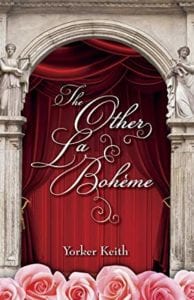
About the Book:
The Other La Bohème is literary fiction that depicts the lives and loves of four friends who pursue opera singers’ careers in present-day New York City. Jennifer (soprano), Stephanie (mezzo-soprano), Henry (tenor), and John (baritone) met in music school in Manhattan, where they performed Puccini’s famous opera La Bohème at their graduation concert. After graduation they banded together as a group called the Dolci Quattro, pledging to support one another in their professional pursuits. Several years later, they have landed the roles of Mimi, Musette, Marcello, and Rodolfo in the nearly forgotten opera La Bohème by Leoncavallo–known as “the other La Bohème”–which is to be produced by the New York Bel Canto Opera.
The novel begins with arias and a duet sung by Henry and Stephanie in the Café Momus. Jennifer and John come in, and they congratulate each other on their new roles. Immediately, though, the thoughts of the current state of their personal lives cool their enthusiasm.
As the story unfolds, Jennifer discovers that her fiancé, Richard, an investment banker and a fiction writer, is having an affair with another woman. Stephanie struggles to find a steady love, while perturbed by a strained relationship with her father, a billionaire hedge fund manager, who abandoned her late mother. Henry faces a pressure from his family to renounce his bohemian life for a more respectful career as he meets his new love, Christine, a poet. John receives a summons for divorce from the lawyer of his wife Michelle, a painter.
Set in the rich artistic backdrop of New York City, the Dolci Quattro’s lives and loves go through ups and downs in joy and despair, while true to their pledge they give one another much-needed moral support. As the opening night nears, the Dolci Quattro make their utmost efforts to perfect their singing for the opera that will determine their future.
Read an Excerpt:
Featured in April/May 2017 Issue: The Eighties
Overture
Begin your song, oh Muses.
Let me join the zesty tune.
My heart needs no more sorrow,
Neither discord nor despair.
Induce me to embrace love,
Peace, and hope in harmony.
Lift, lift me up, oh Muses.
Let us sing a song of joy.
Act I
Scene 1
Muses were singing in glory in the fine October sky—the image Henry saw in the clouds as he strolled along Broadway near 72nd Street, several blocks from the Metropolitan Opera House. He even recognized the Muses’ sweet song. His chest swelled in anticipation as he continued a few blocks to the Café Momus, where his friend Stephanie was working as a waitress. The restaurant attracted a loyal clientele among connoisseurs of opera and classical music, who appreciated the authentic French cuisine at reasonable prices, especially before or after a performance at one of the many nearby theaters. Henry paused outside the window and peered in. Since it was not yet five o’clock, patrons occupied fewer than half of the thirty-odd tables. Stephanie stood before the bar in her black uniform, casually watching the customers. Henry fished a digital pitch-maker from his pocket and found C-sharp. He cleared his throat and inhaled, assuming the role of Marcello. Then he burst through the door and began singing, extending his hand toward Stephanie.
“O Musette, o gioconda sorridente!” (“Oh Musette, oh radiant smile!”)
Stephanie broke into just such a smile as Henry continued his serenade in his burning tenor voice, praising her charms. His rich tones reverberated in the intimate restaurant. Stephanie immediately replied to his aria in her coloratura mezzo-soprano, wagging her right index finger.
“Badate! I miei difetti non nascondo.” (“Mind you! I don’t hide my defects.”)
She cautioned Marcello that she was a capricious vagrant, living day to day. When she completed her aria, both joined in a duet: Marcello, adoring her, and Musette, warning him. The music entwined to a dramatic climax with a soaring high A, then descended slowly, ending with their simultaneous murmur: “Musette!”…“Badate!”
“Bravo!” Waiters and waitresses shouted their kudos while the patrons applauded. Henry bowed and Stephanie curtsied. As they rose, they met each other’s eyes and laughed. …
